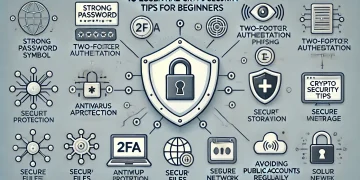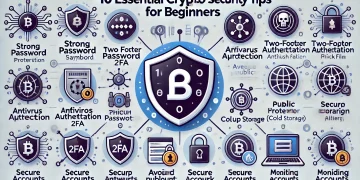Blockchain technology is one of the most groundbreaking innovations in recent years, offering a transformative way to handle data and transactions in a decentralized manner. Initially developed to support Bitcoin, the first cryptocurrency, blockchain has since evolved into a versatile technology with applications across various industries. Whether you’re curious about how cryptocurrencies work or intrigued by the possibilities of blockchain in sectors like finance, healthcare, and supply chain management, this guide will provide you with a clear understanding of blockchain technology.
In this comprehensive guide, we will break down the fundamentals of blockchain, its key features, how it works, and its potential applications.
Table of Contents
- What is Blockchain Technology?
- History of Blockchain Technology
- How Does Blockchain Work?
- Key Features of Blockchain
- Decentralization
- Transparency
- Security
- Immutability
- Blockchain vs Traditional Databases
- Types of Blockchain Networks
- Public Blockchain
- Private Blockchain
- Consortium Blockchain
- Hybrid Blockchain
- How Blockchain is Revolutionizing Industries
- Financial Sector
- Healthcare
- Supply Chain Management
- Real Estate
- Voting Systems
- Smart Contracts: A Core Functionality of Blockchain
- Cryptocurrencies and Blockchain
- Bitcoin
- Ethereum
- Other Cryptocurrencies
- Blockchain and Decentralized Finance (DeFi)
- Challenges Facing Blockchain Technology
- Scalability
- Energy Consumption
- Regulation
- The Future of Blockchain Technology
- Frequently Asked Questions about Blockchain Technology
1. What is Blockchain Technology?
Blockchain technology is a distributed ledger system that allows data to be stored across a network of computers in a way that ensures security, transparency, and immutability. Unlike traditional databases, which are centralized, blockchain operates in a decentralized manner, meaning no single entity has control over the entire system. Instead, data is validated and recorded across a network of nodes, ensuring that all participants in the network have access to the same data.
At its core, blockchain is composed of a series of blocks, each containing data (such as transaction details), a timestamp, and a cryptographic hash of the previous block. This forms a continuous chain—hence the name “blockchain.”
2. History of Blockchain Technology
Blockchain technology was first conceptualized in 2008 by an individual or group of individuals under the pseudonym Satoshi Nakamoto, who introduced it in the context of Bitcoin, the first decentralized cryptocurrency. Bitcoin’s primary goal was to enable peer-to-peer transactions without relying on intermediaries such as banks. The first Bitcoin block, known as the “Genesis Block,” was mined in January 2009.
While Bitcoin introduced blockchain to the world, it wasn’t until a few years later that developers began exploring other uses for blockchain beyond cryptocurrency. In 2015, Ethereum, a second-generation blockchain, was launched, offering a platform for decentralized applications (dApps) and smart contracts, further expanding blockchain’s potential applications.
3. How Does Blockchain Work?
Blockchain operates on a peer-to-peer (P2P) network of computers, often referred to as nodes. Each node in the network maintains a copy of the entire blockchain. When a new transaction is initiated, it must be validated by the network before being added to the blockchain. This process typically involves a consensus mechanism, such as Proof of Work (PoW) or Proof of Stake (PoS), to ensure that all participants in the network agree on the transaction’s validity.
Once validated, the transaction is bundled with other transactions into a block. The block is then added to the existing chain of blocks, creating a permanent, unalterable record. This decentralized and transparent nature makes blockchain highly secure and tamper-resistant.
4. Key Features of Blockchain
Blockchain technology offers several unique features that differentiate it from traditional data storage and transaction systems.
Decentralization
In a traditional centralized system, a central authority manages the database and controls access to it. Blockchain, on the other hand, distributes control across a network of nodes, ensuring that no single entity has control over the entire system.
Transparency
All transactions recorded on the blockchain are visible to every participant in the network. This transparency builds trust and allows for easy auditing and verification of data.
Security
Blockchain uses cryptographic techniques to secure data, making it nearly impossible to alter or tamper with information once it’s been recorded. The decentralized nature of the network further enhances security, as a hacker would need to compromise a majority of the nodes to manipulate the data.
Immutability
Once data is added to the blockchain, it cannot be changed or deleted. This immutability is one of blockchain’s most significant advantages, particularly in applications that require a permanent and verifiable record, such as financial transactions or supply chain tracking.
5. Blockchain vs Traditional Databases
While traditional databases are centralized and rely on a trusted authority to manage data, blockchain is decentralized, allowing multiple participants to maintain and update the ledger without the need for a central authority.
In traditional databases, data can be modified or deleted by the central authority. In contrast, blockchain records are immutable, meaning once data is added to the ledger, it cannot be changed. This immutability ensures a higher level of trust and security in blockchain-based systems.
Another key difference is the way transactions are validated. Traditional databases often require a third-party intermediary, while blockchain relies on consensus mechanisms like PoW or PoS to validate transactions in a decentralized manner.
6. Types of Blockchain Networks
There are several types of blockchain networks, each with different characteristics and use cases.
Public Blockchain
A public blockchain is open to anyone who wants to participate. Anyone can read, write, or validate data on the blockchain. Bitcoin and Ethereum are examples of public blockchains.
Private Blockchain
A private blockchain is restricted to a specific group of participants. It is often used by organizations that require control over who can access and validate transactions on the blockchain. Private blockchains are more centralized than public blockchains.
Consortium Blockchain
A consortium blockchain is semi-decentralized. It is controlled by a group of organizations rather than a single entity. This type of blockchain is often used by industries that need to collaborate on data sharing, such as banks or supply chain partners.
Hybrid Blockchain
Hybrid blockchains combine elements of both public and private blockchains. They allow for some data to be publicly accessible while keeping other data private. Hybrid blockchains are used in scenarios where both transparency and privacy are required.
7. How Blockchain is Revolutionizing Industries
Blockchain technology is making waves across various industries, offering new ways to enhance efficiency, transparency, and security.
Financial Sector
In finance, blockchain is revolutionizing the way transactions are conducted. With blockchain, transactions can be completed faster, with lower fees, and without the need for intermediaries like banks. Blockchain also allows for the creation of new financial products, such as decentralized finance (DeFi) applications.
Healthcare
In healthcare, blockchain can be used to securely store and share patient records. It can also be used to track the supply chain of pharmaceuticals, reducing the risk of counterfeit drugs.
Supply Chain Management
Blockchain can enhance supply chain transparency by providing a verifiable record of the entire supply chain process. This allows businesses and consumers to track the origin and journey of products, ensuring authenticity and ethical sourcing.
Real Estate
Blockchain can streamline the real estate transaction process by providing a transparent and immutable record of property ownership. Smart contracts can also be used to automate the transfer of ownership and other legal processes.
Voting Systems
Blockchain has the potential to revolutionize voting systems by providing a secure and transparent way to cast and count votes. This could reduce the risk of fraud and increase voter trust in the election process.
8. Smart Contracts: A Core Functionality of Blockchain
Smart contracts are self-executing contracts with the terms of the agreement directly written into code. These contracts automatically execute and enforce themselves when predefined conditions are met. Smart contracts are most commonly associated with the Ethereum blockchain and are used in a wide range of applications, from financial services to real estate transactions.
Smart contracts eliminate the need for intermediaries, reducing costs and speeding up transactions. Because they are stored on the blockchain, smart contracts are secure, transparent, and immutable.
9. Cryptocurrencies and Blockchain
One of the most well-known applications of blockchain technology is its use in cryptocurrencies. Cryptocurrencies are digital assets that use blockchain as their underlying technology to secure transactions and control the creation of new units.
Bitcoin
Bitcoin was the first cryptocurrency and remains the most well-known. It was created to enable peer-to-peer transactions without the need for a trusted third party, such as a bank. Bitcoin relies on the Proof of Work consensus mechanism to validate transactions.
Ethereum
Ethereum is a second-generation blockchain that introduced smart contracts and decentralized applications (dApps). While Bitcoin is primarily used as a store of value, Ethereum’s blockchain is a platform for developers to build a wide range of decentralized applications.
Other Cryptocurrencies
In addition to Bitcoin and Ethereum, there are thousands of other cryptocurrencies, each with its own use cases and features. Some, like Litecoin, focus on faster transaction speeds, while others, like Monero, prioritize privacy.
10. Blockchain and Decentralized Finance (DeFi)
Decentralized Finance, or DeFi, is an emerging sector that uses blockchain technology to offer financial services without intermediaries. DeFi applications allow users to lend, borrow, trade, and earn interest on digital assets, all without relying on traditional financial institutions.
DeFi is built on the principles of transparency, security, and accessibility, and has the potential to disrupt traditional finance by offering open and permissionless access to financial services.
11. Challenges Facing Blockchain Technology
While blockchain holds immense potential, it is not without its challenges.
Scalability
One of the biggest challenges facing blockchain is scalability. As more transactions are added to the blockchain, the network can become slower and more expensive to operate. Various solutions, such as layer-2 scaling and sharding, are being developed to address this issue.
Energy Consumption
Blockchain networks that use Proof of Work, such as Bitcoin, require significant amounts of energy to validate transactions. This has raised concerns about the environmental impact of blockchain technology. Proof of Stake and other consensus mechanisms are seen as more energy-efficient alternatives.
Regulation
Blockchain operates in a largely unregulated space, which presents challenges for governments and financial institutions. The decentralized nature of blockchain makes it difficult to enforce regulations, and there are ongoing discussions about how best to regulate blockchain technology without stifling innovation.
12. The Future of Blockchain Technology
The future of blockchain technology is bright, with continued advancements expected in scalability, security, and adoption. As more industries recognize the benefits of blockchain, we are likely to see even greater integration of this technology into our daily lives.
From decentralized finance to supply chain transparency, blockchain has the potential to transform how we interact with the world around us. As challenges such as scalability and regulation are addressed, blockchain is poised to become a foundational technology for the future.
Frequently Asked Questions about Blockchain Technology
- What is blockchain technology in simple terms? Blockchain is a decentralized ledger that records transactions across multiple computers. It ensures that data is secure, transparent, and immutable.
- Is blockchain only used for cryptocurrencies? No, while blockchain is the technology behind cryptocurrencies like Bitcoin, it has many other applications, such as in supply chain management, healthcare, and voting systems.
- How does blockchain ensure security? Blockchain uses cryptography to secure data and relies on a decentralized network of nodes to validate transactions, making it highly resistant to tampering and fraud.
- What are smart contracts? Smart contracts are self-executing contracts with the terms of the agreement directly written into code. They automatically execute when specific conditions are met.
- What is the difference between a public and private blockchain? A public blockchain is open to anyone, while a private blockchain restricts access to a specific group of participants.
- What challenges does blockchain face? Blockchain faces challenges such as scalability, high energy consumption, and regulatory uncertainty. However, ongoing developments aim to address these issues.
Blockchain technology is still in its early stages, but its potential to revolutionize industries is undeniable. As more people and businesses begin to understand its capabilities, blockchain will continue to reshape the digital landscape, bringing about a more decentralized and secure future.






























